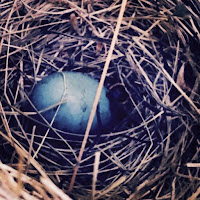

I first ran away when I was five. My father sat on the stoop with a grave goodbye. He respected my conviction but was sorry to see me go. I'd packed my orange and pink flowered vinyl suitcase, underwear, clean shirt, Thumbelina... I didn't want to hurt him, but I'd be moving on.
He watched me trot down Mifflin Avenue, my back straight as I passed Mrs. Easley's Dwarf Irises. In the next yard, the black lab, Sylvester, chewed a tattered yellow tennis ball, a few more paces, and I passed the mean lady's house until I was near the corner of Overton, my heart racing along with me.
I didn't look back, sure my eagle-eyed father could see me this far down the avenue. Relieved as I turned the corner by the Ritter's house, now I could let my belly full of fear and melancholy heave through my chest and throat. I bent over in tears, sad to think of my mother's heartbreak when she discovered me gone. The site of the chain-link fence around Ruth Ritter's yard, her father's vegetable garden, the swing set, the sandbox still built with our afternoon imaginings, all this filled me with comfort. I thought for a moment to turn down the Mifflin alleyway toward what used to be my backyard.
Instead, I took steely steps down Overton toward Trenton Avenue and stood on the corner doors away from the Caliguri's on the border of a dozen strange houses. I ventured on. A slow car passed my low wet vision on this unfamiliar street with fewer trees, the lawns were bare, and the hedges were overgrown. Aging Victorian homes with peeling paint and dark-eyed windows advanced my tiny feet. When I reached a familiar house on the corner of Trenton and Hutchinson, the Bailey sisters who sold homemade cookies and who I'd often visited, back in the day.
"Mom says I can't ask, but if you offer, I can have a cookie."
I hadn't known this alternate route to the Bailey's. The back of their house was a kitty-corner to my former home. I'd traveled this long and far, only to find myself nearly back where I'd started. I was sure my father would laugh at me when he saw me turn the corner of Hutchinson back onto Mifflin. But, instead, he welcomed me as if I was returned from a long and arduous journey. He offered hugs and celebrations.
The second time I 'ran away,' I was seventeen, pregnant, and upset with my older siblings. They'd been hassling me, trying to influence the choices I was about to make. I'd left Mifflin Avenue in a whirl of tears and drama for the apartment of a public health nurse who lived in an unfamiliar part of town but had offered me help and kindness. There were tenements, two and three-family homes, parked cars lining the street curbs, and no trees in her neighborhood. My father discovered my whereabouts and called me to visit for a talk. He was considerate toward me and respectful in a way that confused me. I thought he'd be angry with me.
We sat together in the dingy kitchen of this strange apartment. I cried, and so did my father when he asked me to come home, assuring me that no one would bother me with opinions about my plans or my baby. When I labored to give birth to a daughter, it was my dad who held my hand all through that long life-altering night. A father of five, he had never seen a woman in labor. He later told my mother if he'd seen her endure one childbirth, she would not be the mother of five. I don't recall his words when he met his new grandchild, yet more than forty years later, I remember his face as they wheeled me and my daughter from the delivery room to meet him.
On Father's Day, dad left Mifflin Avenue in an ambulance I'd summoned there for him fifteen months later. I yelled at curious neighbors to stop staring and go back into their houses. My lately walking daughter clung to my leg. So here was my remarkable father, fallen. I felt so protective yet helpless to shield him from his fate.
Dad never returned to Mifflin Avenue, and somehow, I, too, have since been missing.
 A woman’s body is the rent payment.
A woman’s body is the rent payment. 









